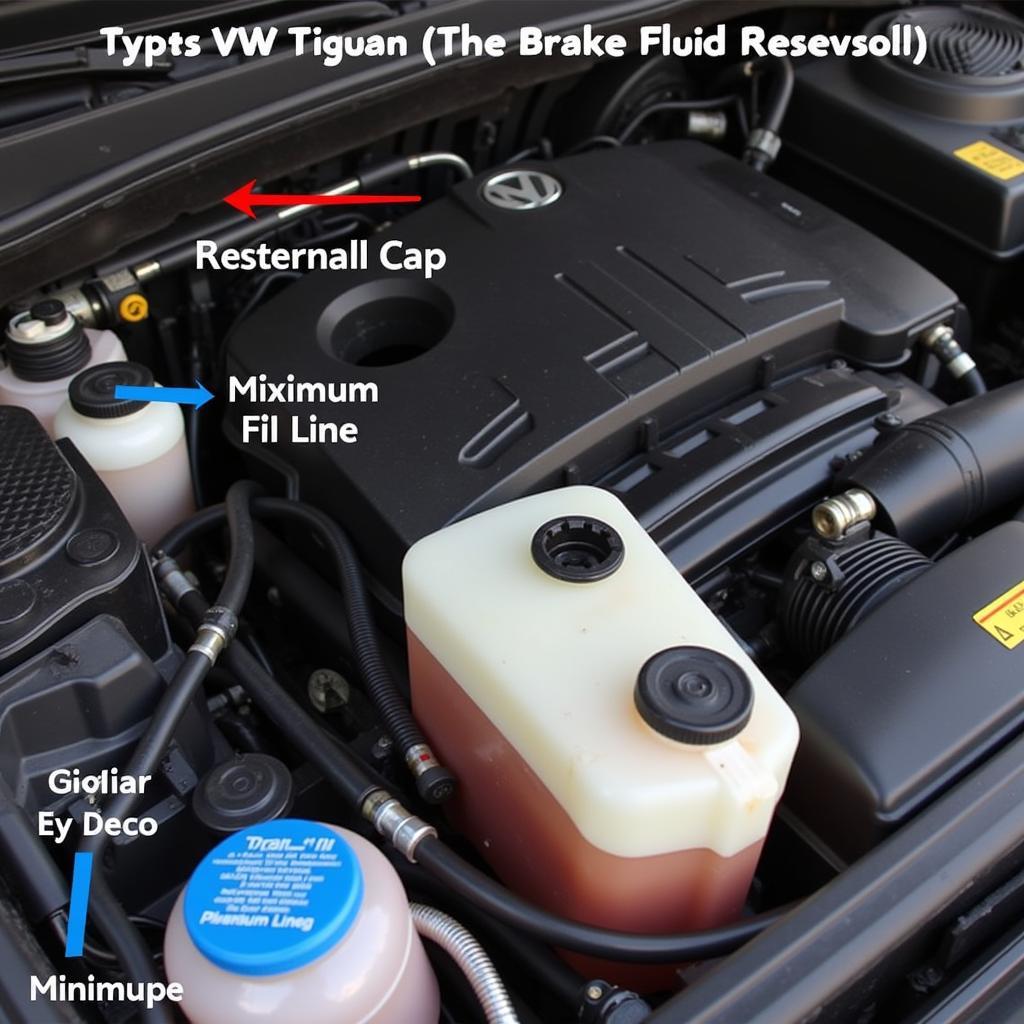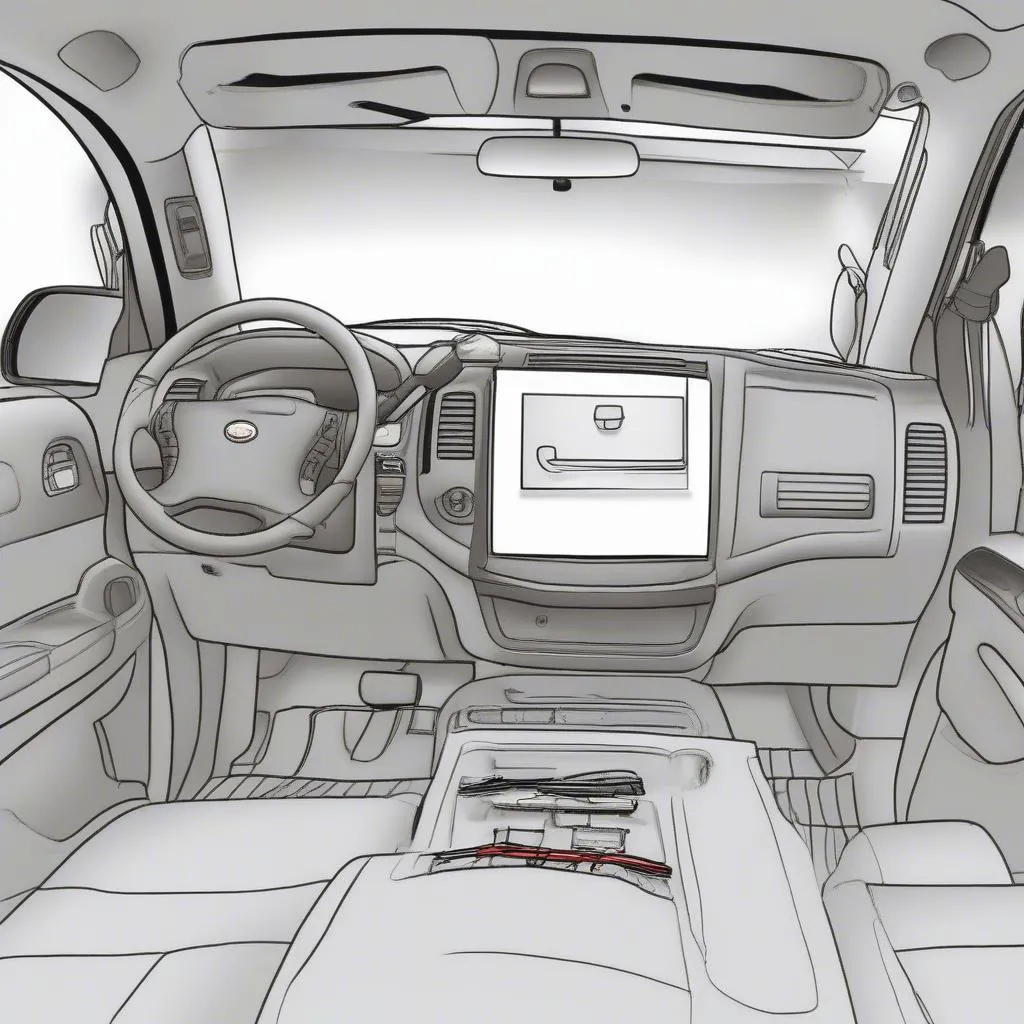The VW Tiguan brake fluid warning light is a crucial indicator of your vehicle’s braking system health. Ignoring this light can lead to serious safety issues. This guide provides in-depth information on understanding, diagnosing, and resolving the issue when your VW Tiguan brake fluid warning light illuminates. We’ll cover everything from simple checks to more complex solutions, empowering you to take control of your vehicle’s safety. This article will help you understand why your VW Tiguan brake fluid warning light is on and what to do about it. For issues relating to your parking brake, you might want to check out resources on the VW Tiguan parking brake warning light.
Understanding the various warning lights in your VW Tiguan is essential for safe driving. If you’ve encountered the Subaru brake warning light, this information might also be helpful.
The brake fluid warning light in your VW Tiguan can indicate several potential problems, ranging from low brake fluid levels to more serious issues within the braking system itself.
Why is My VW Tiguan Brake Fluid Warning Light On?
There are several reasons why your VW Tiguan brake fluid warning light might be on. The most common culprit is low brake fluid. This can be due to normal wear and tear of your brake pads, a leak in the brake lines, or a malfunctioning brake caliper. If you notice your electric parking brake warning light vw tiguan illuminated alongside the brake fluid warning light, it could indicate a related issue within the parking brake system.
Low Brake Fluid Level
Brake fluid is essential for transferring the force from your foot on the brake pedal to the brake calipers, which then clamp down on the rotors to stop your vehicle. As brake pads wear down, the brake calipers need to extend further to compensate, leading to a decrease in the brake fluid level in the reservoir.
Brake Fluid Leak
A leak in the brake system, whether in the lines, hoses, or calipers, can also cause the brake fluid level to drop and trigger the warning light. A leak can be dangerous as it can lead to brake failure. If you suspect a leak, it is crucial to have your vehicle inspected immediately.
Worn Brake Pads
Worn brake pads are another common reason for the brake fluid warning light to illuminate. As the pads wear down, the brake calipers need to extend further, requiring more brake fluid to fill the space. This can cause the fluid level to drop low enough to trigger the warning light. Check out if you want to learn about vw tiguan electronic parking brake warning light.
 VW Tiguan Brake Fluid Reservoir Location
VW Tiguan Brake Fluid Reservoir Location
What to Do When the VW Tiguan Brake Fluid Warning Light Comes On
If your VW Tiguan brake fluid warning light comes on, the first step is to safely pull over and check the brake fluid level in the reservoir. If the level is low, carefully add the correct type of brake fluid, ensuring not to overfill. However, adding fluid is only a temporary fix. It’s crucial to determine the underlying cause of the low fluid level, be it worn brake pads or a leak.
Checking the Brake Fluid Level
Locate the brake fluid reservoir, typically a translucent plastic container with minimum and maximum markings. If the fluid level is below the minimum mark, it needs to be topped off. You can find more information about brake warning sensors in the does the 2019 vw tiguan have brake warning sensors article.
Adding Brake Fluid
Use the correct type of brake fluid specified in your VW Tiguan’s owner’s manual. Carefully add fluid until it reaches the maximum mark, avoiding spills.
Seeking Professional Help
If the brake fluid warning light remains on after adding fluid, or if you suspect a leak, it’s essential to seek professional help immediately. Driving with low brake fluid or a leak can be extremely dangerous and can lead to brake failure. A qualified mechanic can diagnose the problem and recommend the necessary repairs. For other Subaru models, you can learn more from this resource on subaru brake warning light.
“Ignoring a brake fluid warning light is like ignoring a ticking time bomb. It’s crucial to address the issue immediately to prevent potential brake failure.” – John Davis, Automotive Engineer.
Preventing Brake Fluid Warning Light Issues
Regular maintenance is key to preventing brake fluid warning light issues. This includes having your brakes inspected at recommended intervals, typically during routine service appointments. A mechanic can check the condition of your brake pads, rotors, calipers, and brake lines to identify any potential problems before they become serious.
“Preventive maintenance is the best way to avoid costly repairs and ensure the safety of your VW Tiguan’s braking system.” – Maria Sanchez, Certified Mechanic.
Conclusion
The VW Tiguan brake fluid warning light is a vital safety indicator. Understanding its significance and taking prompt action can prevent serious problems and ensure your safety on the road. Remember to check your fluid levels regularly and seek professional help if you encounter any issues. If you are experiencing issues with your parking brake warning light, you might find helpful information on the vw tiguan parking brake warning light page. Don’t ignore the vw tiguan brake fluid warning light!
FAQ
- What does the VW Tiguan brake fluid warning light look like? It’s typically a circular symbol with an exclamation point in the center, enclosed by parentheses.
- Is it safe to drive with the brake fluid warning light on? No, it’s not safe. It indicates a potential problem with your braking system.
- Can I add brake fluid myself? Yes, but ensure you use the correct type and don’t overfill. If the light remains on, seek professional help.
- How often should I check my brake fluid level? It’s a good practice to check your brake fluid level at least once a month.
- What if my brakes feel spongy? Spongy brakes can indicate air in the brake lines, which requires professional bleeding.
- How much does it cost to fix a brake fluid leak? The cost varies depending on the location and severity of the leak.
- Can worn brake pads cause the brake fluid warning light to come on? Yes, as the pads wear, the fluid level drops, potentially triggering the warning light.

